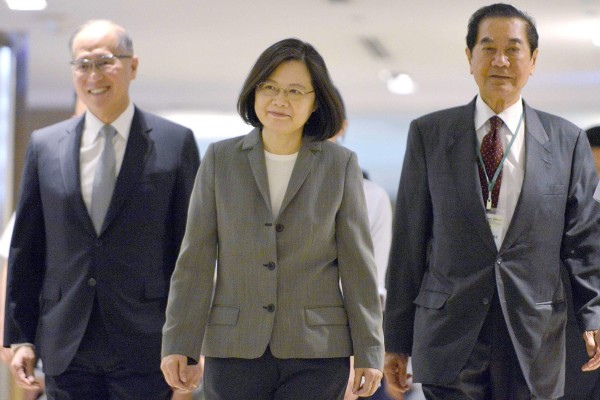《TAIPEI TIMES》 Tsai, Cheney stress ‘status quo’

From left, Minister of Foreign Affairs David Lee, President Tsai Ing-wen and Taiwan Prospective Foundation chairman Mark Chen arrive yesterday at the Asia-Pacific Security Dialogue in Taipei. Photo: Sam Yeh, AFP
TAIPEI GATHERINGS: The president gave the opening address to the Asia-Pacific Security Dialogue forum, while a former US vice president spoke at a private luncheon
By Chen Wei-han / Staff reporter
President Tsai Ing-wen (蔡英文) yesterday told an international forum in Taipei that her administration is committed to maintaining the “status quo” in cross-strait relations and regional stability, while former US vice president Dick Cheney told a separate gathering that the cross-strait “status quo” was vital to maintaining peace in the region.
To ensure regional stability and growth, Taiwan has to play “a more proactive role” in the region while building strong trade, defense and people-to-people relationships with its neighbors, Tsai said in her opening speech to the Asia-Pacific Security Dialogue.
The New Southbound Policy was launched to connect with ASEAN and South Asian countries and address the long-term bilateral and multilateral need to closely integrate Taiwan into the region, Tsai said.
Taiwan has also sought stronger relations with other stakeholders in the Asia-Pacific region, including the US and Japan, she said.
Joining the Trans-Pacific Partnership would still be a priority for Taiwan, even though the US has pulled out of the trade pact, she said.
Tsai stressed the significance of a cross-strait relationship based on peace and prosperity in the region while reiterating her policy of maintaining the “status quo.”
“My administration remains fully committed to maintaining the ‘status quo.’ However, this cannot be achieved by one side alone. It takes goodwill and cooperation from both sides,” she said, calling on Beijing to reciprocate.
While the disputed South China Sea has become a potential flashpoint, Taiwan would not engage in aggression, but would transform Itu Aba Island (Taiping Island, 太平島) into a base for humanitarian and research purposes, with maritime search and rescue operations and climate research to be conducted from the island, she said.
To contribute to regional security, Taiwan has stepped up efforts to prevent money laundering and shipments to North Korea as part of the international economic sanctions on Pyongyang, Tsai said.
Taiwan’s geological location “dictates that Taiwan will always have a role in maintaining peace and stability in the Asia-Pacific,” she added.
Tsai thanked Cheney for his contribution to passage of the Taiwan Relations Act in 1979, when he was in the US House of Representatives, as the act has shaped Taiwan-US relations and broader Asia-Pacific relations.
Cheney told a private luncheon that he strongly supports the “status quo” in Taiwan-China relations to ensure peace and stability in the region, according to one of the attendees, Democratic Progressive Party Legislator Liu Shih-fang (劉世芳).
Cheney was asked if there was any way to ease cross-strait tension, and he said it would be most appropriate to maintain the “status quo,” Liu said.
Although the cross-strait situation has changed from when he was US vice president, he believes that the two sides of the Taiwan Strait should not make any unilateral changes to regional peace and stability, Liu said.
新聞來源:TAIPEI TIMES

















